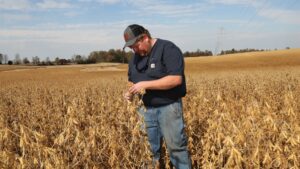Navigating the Turbulent Waters of Agriculture: A Soybean Farmer’s Perspective
In the heart of Magnolia, Kentucky, Caleb Ragland is more than just a soybean farmer. He is a steward of a legacy, with his family farming the land for over two centuries. However, as he votes for President Trump in the upcoming elections, he finds himself navigating a treacherous landscape shaped by tariffs and mounting agricultural challenges.
Caleb represents a growing concern among farmers across the United States. In recent years, he has experienced a staggering decline in soybean prices—over 40% in futures according to recent reports—while production costs continue to rise. This scenario paints a grim outlook for farmers who already feel the weight of external factors beyond their control. As he notes, “When you have policies that manipulate our prices by 20%, 30%, and our costs are going up, it becomes nearly impossible to sustain our farming traditions.”
The Impact of Tariffs on Agriculture
Ragland’s situation isn’t unique. Farmers across the nation are grappling with the consequences of tariffs imposed by the Trump administration, with retaliatory measures from other countries further complicating matters. During the trade war with China in 2018, the agricultural sector experienced losses exceeding $27 billion. Soybeans accounted for a whopping 71% of these losses, leaving a lasting mark that many argue has not yet been fully recovered.
“Tariffs break trust,” says Ragland. The soybean market was once a thriving segment of the U.S. agricultural landscape, but the ongoing trade friction has led to a significant decline in the U.S.’s market share for soybean exports, particularly to China, the world’s largest buyer of the commodity.
An Uncertain Future
With recent tariff escalations—including a 25% duty on goods from Canada and Mexico and a continued 10% charge on Chinese imports—the outlook for farmers is precarious. Ragland argues that “we’re already at the point that we’re unprofitable,” exacerbating the already challenging environment for agricultural producers. He emphasizes the urgent need for the industry to pursue trade agreements that alleviate these burdens and offers a renewed focus on creating a comprehensive farm bill that can sustain farmers through tough times.
On the cusp of the spring planting season, mixed reports signal that the agricultural economy may not be as optimistic as it seems. While a recent Ag Economy Barometer suggested that farmer sentiment slightly improved, nearly half of the respondents identified trade policy as the most crucial aspect affecting their businesses in the coming years.
Riding the Wave of Market Changes
As the agricultural landscape evolves, the implications of tariffs could lead to more conservative purchases of crop inputs, impacting fertilizer suppliers like Nutrien, Mosaic, and CF Industries. This trend could pose significant resilience challenges for farmers as they seek to balance cost efficiency with the necessities of production.
Even stocks tied to agriculture have felt the effects. Companies like Mosaic and CF Industries have seen declines, reflecting broader concerns that profitability will dip, directly impacting the livelihoods of numerous farmers. While some analysts anticipate a rebound, strategists like Kristen Owen warn that the tariffs could cement Brazil’s position as the leading global producer of both corn and soy, diminishing the U.S.’s historical dominance and turning it into a supplementary supplier.
Looking Ahead: Building a Sustainable Future
In such turbulent times, Ragland’s plea resonates deeply across the agricultural community: “We need relief through deals that reduce barriers to trade and support programs through a new farm bill.” The future is uncertain, but with concerted effort from industry stakeholders, policymakers can help pave a path toward recovery and renewed trust in U.S. agriculture.
At Extreme Investor Network, we are committed to staying at the forefront of economic developments that impact agricultural investments. Our dedicated team is continuously analyzing market trends and providing valuable insights that empower our investors and the agribusiness community. Whether it’s navigating tariff impacts or identifying emerging opportunities, we strive to deliver the information you need to make informed decisions.
Join us on this journey as we explore the evolving landscape of agriculture and investment, transforming challenges into opportunities. The future of American farming is not just about survival; it’s about thriving in the face of adversity. Stay connected with Extreme Investor Network to be part of this crucial conversation.

